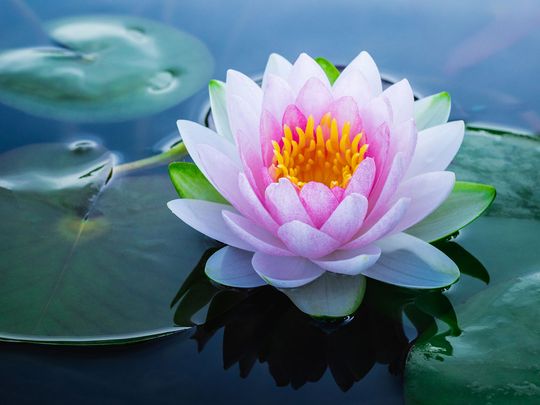
“What should a man — or woman — of peace do in a time of war? This is the question I wanted to pose to the Digambar Jain Acharya 108 Anand Sagar “Mouni.”
Mouni means the silent one. Acharya is a title given to the highest teachers in the Jain order. Jains are radically non-violent, so the question was especially pertinent. In addition, this Jain teacher belonged to the most rigorous and severe tradition of penance.
Known as the Digambars, that is the sky-clad, those who belong to this order not only take vows of non-possession and chastity but also eat and drink water only once a day. What is more, they go completely without clothes, whether in summer or winter.
This way of life has been prevalent in India for thousands of years. It is recorded that when Alexander invaded India some 2300 years ago, he encountered such ascetics, who are called Gymnosophists in Greek.
Anand Sagar was born in the small village of Satguva in Madhya Pradesh in 1957. His pre-monastic name was Suresh Kumar. When he was twenty, he received initiation into the order after taking his vows of penance, chastity, poverty, and, ultimately, giving up even the wearing of clothes.
Commitment to non-violence
Since then, he has taught and guided many, composed thousands of works of philosophy and spirituality, and was conferred the title of “Acharya” or supreme teacher. The number 108 as an honorific implies that the Muni is free of 108 defects of character and morality.
I approached him with respect and reverence. He welcomed me with a smile and invited me to sit in front of him. He spoke in Hindi, which I understand very well.
He said that ahimsa was the core principle of Jainism, and that it applied not only to humans but also to animals, plants, and even microorganisms. He explained that Jains practised strict vegetarianism, avoided harming any life form, and observed various rules of conduct to minimise their impact on the environment.
He then asked me if I had any questions for him. I hesitated for a moment, wondering if he would be offended by my query. But then I decided to ask him anyway. I said that I admired his commitment to non-violence, but I wondered how he would deal with a situation of war or conflict.
I said that there were many places in the world where people were suffering from violence, oppression, and injustice. I asked him what he would do if he were in such a situation. Also, there were those who only understood the language of war and violence. How to deal with such as these?
Compassion, wisdom, and detachment
He looked at me with a calm and serene expression. He said that he understood my concern, but he also said that he did not see any contradiction between his faith and his response to war. He said that he would follow the example of Mahavira, the last of the great teachers, who also founded Jainism, as it came to be practised after him. There was never a time of perfect peace in the world. Mahavira himself lived in a time of turmoil and strife in ancient India.
In fact, he was a king who gave up his kingdom to pursue enlightenment. Anand Sagar said that Mahavira taught that violence was the result of ignorance, attachment, and aversion. He said that violence could not be overcome by more violence but only by compassion, wisdom, and detachment.
As a Jain, Anand Sagar said that he would not participate in any war or conflict, but he would also not condemn or judge those who had to do their duty, whether as soldiers of peace, peacekeepers, or upholders of law and order.
He said, “No thought is ever wasted. To seek the peace and enlightenment of all beings is a noble intention. It is bound to take root in the minds of men. There are infinite souls even in a small potato. This samsara is full of living beings. Life cannot be extinguished. It is merely recycled over and over again.”
He said that the duty as a man of peace in a time of war was not to be sucked into this cycle of violence, not to become party to it. An unshakeable peace that could not be sliced, shattered, or broken could be found even during times of great conflict if we could still our minds and make them free of all distortions and disturbances caused by anger, greed, fear, attachment, delusion, and the like. “How?” I persisted, “how to negate this endless cycle of violence and counter-violence in this eternal flow of life that we call samsara?”
I had many questions. What about the very antibodies and white blood cells inside us, which protect us from harmful microorganisms? If they turned peaceful, wouldn’t we be dead long back? Don’t we resort to antibiotics when we are ill? Wasn’t there just and principled violence as opposed to violence as the first principle or preferred mode of coercion and oppression? He did not answer. He smiled at me enigmatically and replied,
“Go into silence. You will find all your answers there. Let whatever happens happen. Observe everything as a witness.”
I took that to mean that there could be no easy or instant peace for us human beings. In fact, the world would continue to be in a state of great turmoil, with hot and cold wars raging about us. But not just outside. Right within our minds. That made the imperative of peace all the more necessary. Being peace activists without ourselves being at peace would be pointless.
Had I understood the enigma of peace in a world of violence? I was not sure. How could there be lasting peace without justice? Perhaps, I had to look within, as the Muni suggested, rather than outside.









